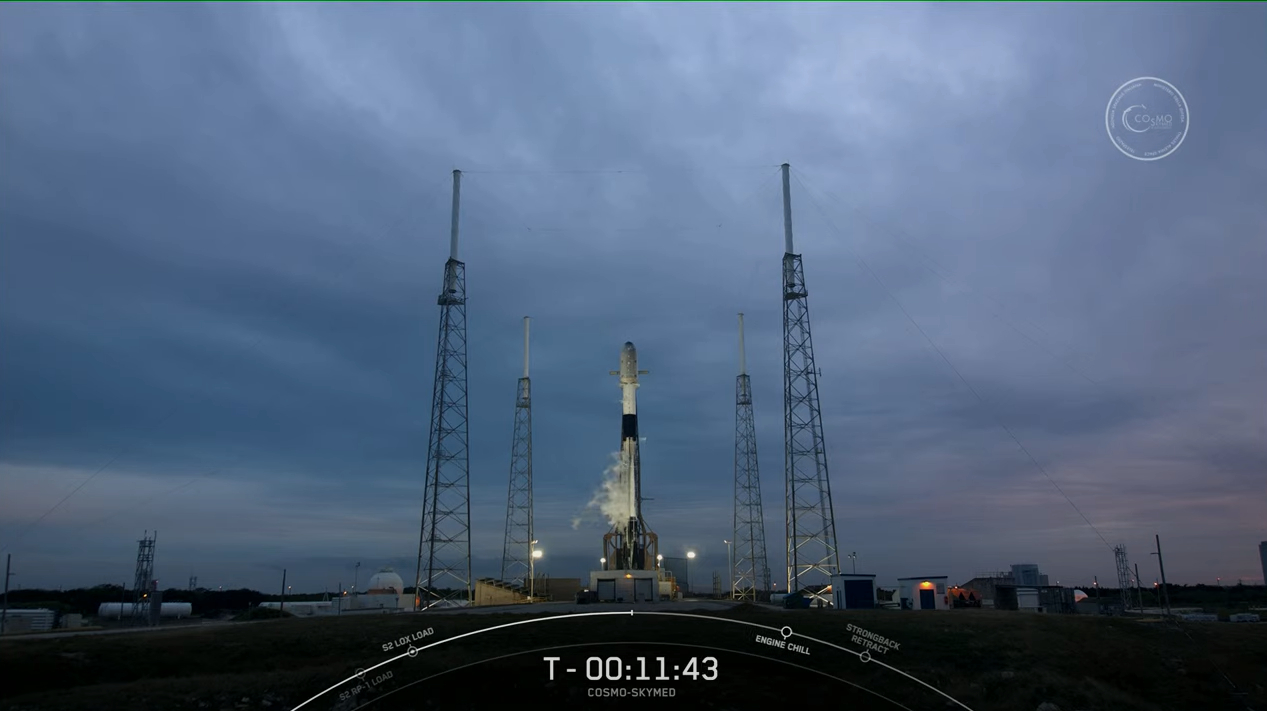
Mother Nature has foiled a planned SpaceX launch for the second day in a row.
A SpaceX Falcon 9 rocket was originally supposed to launch the Cosmo-SkyMed Second Generation FM2 (CSG-2) satellite from Florida's Cape Canaveral Space Force Station on Thursday evening (Jan. 27), but thick clouds and strong winds forced a 24-hour delay.
That has now turned into a 48-hour push, as bad weather nixed today's (Jan. 28) attempt as well.
"We were hopeful that weather conditions were going to improve for liftoff, but unfortunately we are standing down from today's attempt," SpaceX production manager Jessie Anderson said during a webcast of today's launch attempt. "The vehicle and the payload remain in good health, and our next launch opportunity is tomorrow at 6:11 p.m. Eastern time."
You can watch Saturday's (Jan. 29) attempt — which will include a landing of the Falcon 9's first stage at Cape Canaveral shortly after liftoff — here at Space.com, courtesy of SpaceX, or directly via the company. SpaceX webcasts generally start 15 to 20 minutes before liftoff.
Related: The evolution of SpaceX's rockets in pictures
There's an 80% chance of good weather at Cape Canaveral on Saturday, with winds at liftoff and upper-level wind shear as the only concerns, according to a forecast from the U.S. Space Force's Delta 45 group.
Get the Space.com Newsletter
Breaking space news, the latest updates on rocket launches, skywatching events and more!
Cosmo-SkyMed Second Generation is a collaboration among the Italian Space Agency, the Italian Ministry of Defense and the Italian Ministry of Education, Universities and Scientific Research. The system consists of two satellites, which observe Earth using synthetic aperture radar (SAR).
The first of those satellites launched in December 2019 atop an Arianespace Soyuz rocket. That spacecraft, known as CSG-1, zips around Earth in a sun-synchronous polar orbit with an altitude of 385 miles (620 kilometers). CSG-2 will head for the same orbit when it gets off the ground.
Mike Wall is the author of "Out There" (Grand Central Publishing, 2018; illustrated by Karl Tate), a book about the search for alien life. Follow him on Twitter @michaeldwall. Follow us on Twitter @Spacedotcom or on Facebook.
Join our Space Forums to keep talking space on the latest missions, night sky and more! And if you have a news tip, correction or comment, let us know at: community@space.com.

Michael Wall is a Senior Space Writer with Space.com and joined the team in 2010. He primarily covers exoplanets, spaceflight and military space, but has been known to dabble in the space art beat. His book about the search for alien life, "Out There," was published on Nov. 13, 2018. Before becoming a science writer, Michael worked as a herpetologist and wildlife biologist. He has a Ph.D. in evolutionary biology from the University of Sydney, Australia, a bachelor's degree from the University of Arizona, and a graduate certificate in science writing from the University of California, Santa Cruz. To find out what his latest project is, you can follow Michael on Twitter.








